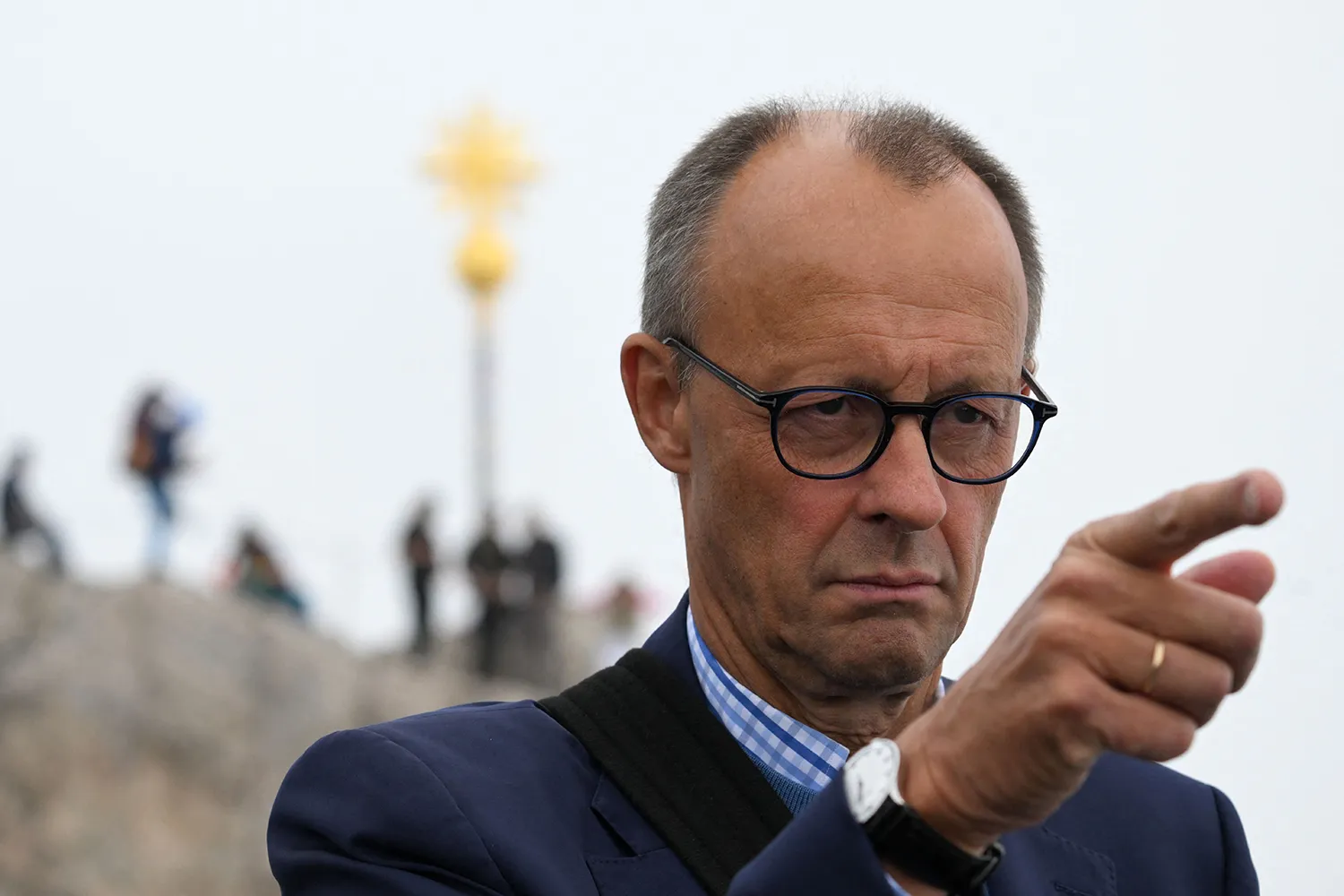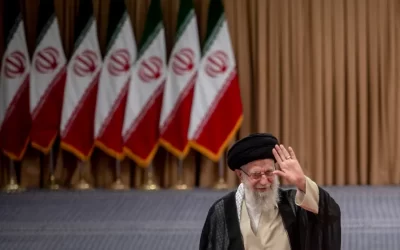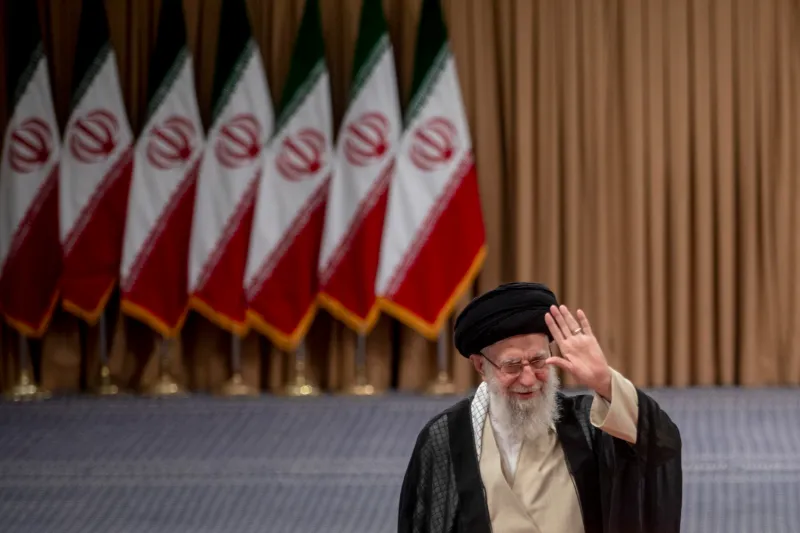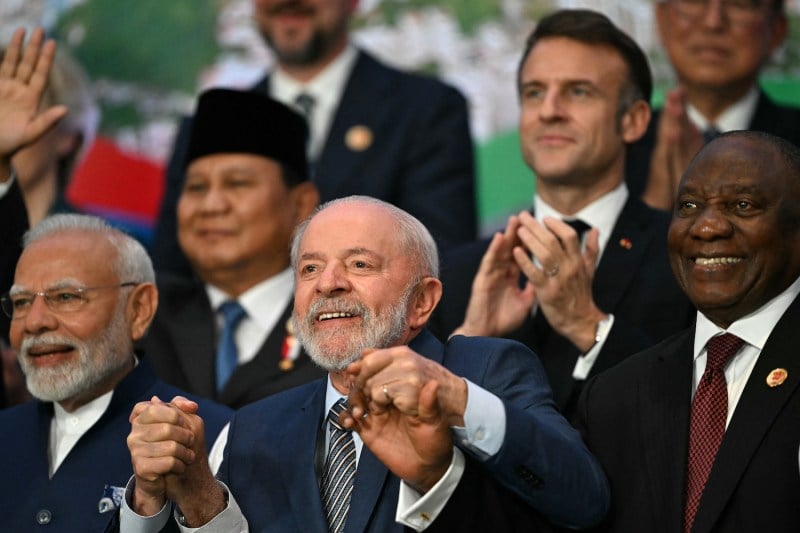Germany’s New 1990s Chancellor

Friedrich Merz gestures during an interview in front of Germany’s highest mountain, Zugspitze, before the conference of the Christian Democratic Union (CDU) party on Sept. 1, 2022. Christof Stache/AFP via Getty Images
It is an indication of how much and how little has changed in Germany over the past 25 years that the most emotional clash in the run-up to this month’s national election was matched by a similar conflict in October 2000—both triggered by the same person. Then, as now, Germany was struggling to cope with a surge in mass immigration. Then, as now,
a provocative intervention from Friedrich Merz, a long-time senior figure in the center-right Christian Democratic Union (CDU) and Germany’s likely next chancellor after the Feb. 23 election, set off a fraught debate over the fate of asylum seekers and integration of migrants. And then, as now, Merz—faced with a firestorm of criticism from activists, a center-left government, and even members of his own party—doubled down on demands that immigrant communities must conform to a national German Leitkultur (or “dominant culture”).
It is an indication of how much and how little has changed in Germany over the past 25 years that the most emotional clash in the run-up to this month’s national election was matched by a similar conflict in October 2000—both triggered by the same person. Then, as now, Germany was struggling to cope with a surge in mass immigration. Then, as now,
a provocative intervention from Friedrich Merz, a long-time senior figure in the center-right Christian Democratic Union (CDU) and Germany’s likely next chancellor after the Feb. 23 election, set off a fraught debate over the fate of asylum seekers and integration of migrants. And then, as now, Merz—faced with a firestorm of criticism from activists, a center-left government, and even members of his own party—doubled down on demands that immigrant communities must conform to a national German Leitkultur (or “dominant culture”).
If last month’s national uproar was particularly intense, that’s because Merz went even further than any mainstream post-war German politician has before, declaring that he was prepared to go “all in” by voting with the far-right Alternative für Deutschland in favor of harsh measures against migrants.
In his long period in the political wilderness after being pushed out of CDU leadership by Angela Merkel in 2002, many commentators had written off Merz’s chances of a comeback because of his impulsive tendency to wander into such rhetorical minefields. Yet they failed to recognize that, as a political animal steeped in the culture of the German center-right, Merz instinctively understood how to gain the support of conservative factions within the CDU that over time became frustrated with Merkel’s more moderate agenda. To appreciate how Friedrich Merz achieved this remarkable comeback, it is worth looking back at the world that shaped him.
Merz in Bonn, Germany, on Jan. 16, 1999. Ulrich Baumgarten via Getty Images
Born in 1955 to a well-off family, Merz grew up in the semi-rural Sauerland region of the West German province—or Bundesland—of North Rhine-Westphalia. Not only was Merz’s father, a judge, a senior figure in the local CDU after 1945, his grandfather rose through the ranks of the CDU’s predecessor Center Party to become mayor of his hometown before switching sides to join the Nazis after they seized power in 1933. As a member of the Sauerland region’s conservative Catholic elite, Merz had the connections needed to swiftly rise up the ranks of the North Rhine-Westphalian CDU in the 1980s.
Alongside this deep cultural conservatism, his economic worldview took shape during the early years of his lucrative legal career. As a lawyer for Germany’s Chemical Industry Association in the 1980s, Merz cultivated useful links with corporate executives at a time when British Prime Minister Margaret Thatcher’s market-driven reforms drew much admiration from German business elites. Merz’s efforts to develop contacts among the CDU’s political partners around Europe and North America also reinforced his firm loyalty to a strong partnership with the United States through NATO, as well as the strengthening of the European Union.
This networking around the CDU party machine that secured then-Chancellor Helmut Kohl’s dominance of German politics during the 1980s and 1990s provided Merz with his first big break into politics as a member of the European Parliament in Brussels, before becoming an MP in the Bundestag, Germany’s parliament, in 1994. His voluble grandstanding in the Bundestag promoting doctrinaire neo-liberalism attracted hostility from factions within the CDU and its allies in the Bavarian Christian Social Union (CSU) whose roots in Christian workers movements and church welfare organizations underpinned a profound commitment to the social protections of a strong welfare state. While Merz’s noisy advocacy for tax cuts and limited state spending drew lasting dislike, even hatred, from leading figures in these more centrist factions (such as Labor Minister Norbert Blüm), he found an ally in Angela Merkel, who had made a name for herself as an effective minister for the environment.
While Merkel’s rapid rise after reunification as a Protestant East German outsider generated resentment among conservatives within the CDU establishment, her support for the market reforms proposed by Merz linked their fates within the party. After the CDU/CSU’s election defeat in 1998 and a party financing scandal the following year that ended Kohl’s career as party leader, Merz helped Merkel become Kohl’s successor in return for being promoted to leader of the CDU parliamentary group. Faced with the Green-Social Democratic Party (SPD) coalition government’s attempts to reform the labor market and simplify access to German citizenship, the combative tone Merz exuded in the Bundestag complemented Merkel’s more conciliatory style as overall leader of the party.
#gallery-2 {
margin: auto;
}
#gallery-2 .gallery-item {
float: left;
margin-top: 10px;
text-align: center;
width: 100%;
}
#gallery-2 img {
border: 2px solid #cfcfcf;
}
#gallery-2 .gallery-caption {
margin-left: 0;
}
/* see gallery_shortcode() in wp-includes/media.php */
- Merz speaks with Angela Merkel prior to Merz’s speech on tax reform at the CDU party congress in Leipzig, Germany, on Dec. 2, 2003.Sean Gallup/Getty Images
- Merkel greets Merz as they arrive for the assembly of the Federal Convention in Berlin on Feb. 13, 2022. Michel Tantussi/AFP via Getty Images
By the early 2000s, Merz had become a standard bearer for conservative factions within the CDU/CSU. Yet this growing prominence came at the cost of increasingly strained relations with Merkel, whose efforts to work with Blüm and other moderates reinforced her reluctance to fully embrace radical free market doctrine. Growing disagreements over policy culminated with an open clash over control of the party that ended in Merz’s sacking after a second electoral defeat for the CDU/CSU in 2002. Along with his cultural conservatism and devotion to free markets, the burning personal resentment towards Merkel that was triggered by this expulsion from frontline politics is crucial to understanding how Friedrich Merz has approached the challenges he faces as candidate for chancellor 20 years later.
Despite a lucrative career as a corporate lawyer, over time Merz began to attract support from many in the CDU who were convinced that Merkel’s management of the Eurozone crisis in the early 2010s and willingness to let hundreds of thousands of refugees into Germany in 2015 betrayed conservative principles. After impatience in the CDU had built up enough momentum to force Merkel to declare that she would retire from politics after elections in 2021, the failure of Merkel’s handpicked successors to prevent the rise of the AfD or the CDU/CSU’s election defeat at the hands of Olaf Scholz’s SPD provided Merz with an opportunity to finally become leader of the party. In a moment when the vulnerabilities of Germany’s economic model became increasingly difficult to ignore, Merz’s repudiation of the centrist approach that defined the Merkel years attracted support from party members who believed that a pivot to cultural conservatism would prevent right-wing voters from shifting their support to the AfD.
Merz gives a thumbs up to delegates after delivering a speech at the conference of the CDU party in Essen, western Germany, on Dec. 14, 2024. Ina Fassbender/AFP via Getty Images
Yet the considerable wealth that Merz had amassed as a corporate lawyer along with his lack of experience in government were glaring weaknesses exploited by his opponents in other parties. Ever since the SPD-Green-FDP governing coalition collapsed over economic policy disagreements in November 2024, the CDU/CSU has hovered around 30% in polls, but hostile commentators have continued to portray Merz as a reactionary relic of a bygone age.
What looks outdated to those on the left who view the CDU dominance of the 1980s and 1990s as a period when Germany failed to adapt to a changing world often generates a warmer response from right-wing voters. Despite the worsening social fault lines that fueled political polarization and economic discontent in western regions during the 1990s, more recent social changes such as the legalization of gay marriage; efforts to combat gender discrimination; and easier access to citizenship for migrant communities had not yet upset established hierarchies. For West Germans who had steady income at the time, the Kohl years are remembered positively as a period when Germany was reunified, the trains ran on time, and houses were affordable even for many working-class families.
This rapid expansion of economic and social horizons for the secure middle class also generated support for the CDU among East Germans who were able to take advantage of the opportunity to reinvent themselves after reunification. Though historical research on the implosion of the East German state remains focused on communities that lost their employers and status through the collapse of communism, there were many other East Germans who viewed themselves as the winners in a race to adapt to technological modernization and cultural liberation. Bitterness over the scars left behind by collapse of the Cold War order still lingers among many who now support the AfD. But members of a middle class that flourished in the first years after reunification are more likely to view Merz’s glorification of the Kohl era in a positive light.
A demonstrator holds a sign with an AI image depicting Alice Weidel and Friedrich Merz kissing in Berlin on Feb. 2.Omer Messinger/Getty Images
The extent to which Merz and his closest allies in the CDU are deeply immersed in these conservative milieus might explain why they seemed so surprised at the visceral hostility elicited by his decision to vote with the AfD for harsh anti-migration measures. In using the murder of a child (who was himself of migrant origin) by an asylum seeker whose deportation had been delayed as a reason to justify this shift toward the far right, Merz echoed a widespread belief among conservatives that the only way to prevent voters from backing the AfD is to abandon what Merkel’s supposedly naive centrism. Surrounded by family, friends, and colleagues that largely share his social background and ideological worldview, Merz seemed unable to grasp why this move sparked the kind of widespread anger that prompted Die Linke (The Left) MP Heidi Reichinnek to declare that protesters must go to “the barricades” against the CDU, and Merkel to issue a highly unusual intervention reminding Merz of his previous commitment to never cooperate with the far right.
The reality that impulsively building an “all in” political strategy on such narrow cultural foundations might be a risky course of action became apparent during the parliamentary vote itself, which Merz lost through votes from CDU MPs associated with the centrist and social welfare factions that remain close to Merkel. While Merz’s attempt to evoke the values of a supposedly simpler past have likely built enough support for the CDU/CSU to take power, his at times clumsy efforts to signal that he will turn back the clock have also fueled disdain from his enemies on the far-right, worsened factional divisions within his own party, and stoked distrust among his (probable) future coalition partners on the center-left. Whether Merz can overcome such self-inflicted dilemmas if the CDU/CSU becomes the largest party in the Bundestag after the elections will depend on how much he can transcend the conservative cultural world that shaped his long march to the top and become a chancellor willing to acknowledge the complex diversity of a changing Germany.
Alexander Clarkson is a lecturer in German and European Studies at King’s College London.
More from Foreign Policy
-

A security guard stands at the entrance to the U.S. Agency for International Development (USAID) headquarters on Feb. 3. DOGE Is Hacking America
The U.S. government has experienced what may be the most consequential security breach in its history.
-

A man with a beard in a suit and tie speaks behind a teleprompter. The logo for MSC is behind him. Vance Leaves Europe Gobsmacked
U.S. Vice President J.D. Vance delivered a rebuke on immigration and alleged censorship to a shocked Munich Security Conference.
-

A Palestinian girl carries a child through the rubble of houses destroyed by Israeli bombardment in Gaza City on March 3, 2024. Why Is the World So Polarized on Gaza?
The answer might be linked to race and colonization, explains author Pankaj Mishra, speaking on FP Live.
-

An attendee dressed like Uncle Sam waits for Donald Trump to arrive for a campaign rally at the Mosack Group warehouse on September 25, 2024 in Mint Hill, North Carolina. America Is Its Own Worst Enemy
It’s not unprecedented for a powerful country to simply shoot itself in the foot.














Join the Conversation
Commenting on this and other recent articles is just one benefit of a Foreign Policy subscription.
Already a subscriber?
.
Subscribe
Subscribe
View Comments
Join the Conversation
Join the conversation on this and other recent Foreign Policy articles when you subscribe now.
Subscribe
Subscribe
Not your account?
View Comments
Join the Conversation
Please follow our comment guidelines, stay on topic, and be civil, courteous, and respectful of others’ beliefs.
Change your username |
Log out
Change your username:
CANCEL
Confirm your username to get started.
The default username below has been generated using the first name and last initial on your FP subscriber account. Usernames may be updated at any time and must not contain inappropriate or offensive language.